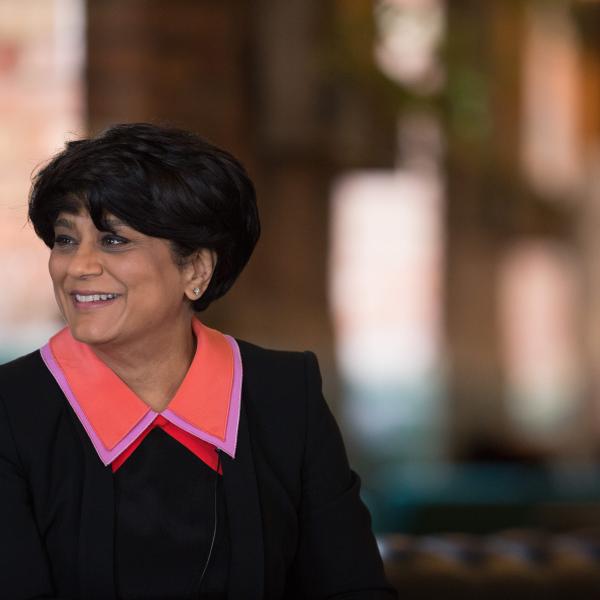‘I wouldn’t be leaning in or leaning out: I would be standing up straight and owning who you are.’
Baroness Shriti Vadera, talking to Oxford Saïd Associate Dean Kathy Harvey on 8 March 2018, was big on authenticity and confidence in prospective women leaders, though less keen on the concept of ‘leaning in’, believing that organisations also have an obligation to their female employees, and that men could do with ‘leaning out a bit.’
Vadera and Harvey were speaking in front of an invited audience of students, alumni, staff and friends at a lunch at The Foundry, Oxford University’s entrepreneurship centre, to celebrate International Women’s Day.
Vadera claimed that her impressive and varied CV owed much to her being ‘very lucky’, and said that ‘successful people who think that it’s all about their incredible talents are probably selling you a lie.’ But she did suggest that there are ways in which people make their own luck, both in seizing opportunities whenever they present themselves and also in having ‘something about how you are that projects to other people that you’re up for taking on an opportunity.’
There is clearly something in how some, though not all, women ‘check themselves, which is different from the way men check themselves’, she said, pointing out the research that has found that, typically, a woman won’t apply for a job unless she is 100% qualified, whereas a man will apply when he is about 50% qualified. ‘Your manager and your employer will take at face value what you are projecting,’ she reminded the audience. ‘They don’t have the time always to create an objective assessment of your abilities. It’s your role to ensure that you project the correct ability and make sure that they understand it.’
Having said that, she added, ‘I really would rather have men lean out a bit. I don’t want roles to be filled by people who are only 50% qualified. I think there must be a happy medium of about 80%. And I think that’s a role for employers and society. I don’t think it should be about women changing who they are. … We will really have succeeded when there are as many mediocre women leaders as there are mediocre men leaders.’
Until then, she is not convinced that the answer is for women to opt out of working for large employers and start their own businesses – not least because female entrepreneurs don’t get access to the same amount of capital. But her main objection was to the idea that women might have to become entrepreneurs as a way of avoiding difficult or unwelcoming work environments: ‘You cannot be in a world where you are forced to make a particular kind of choice. That is not what press for progress is about.’
Vadera said that she had been ‘shocked but not surprised by #MeToo.’ She hoped that it would be possible to use the momentum created by #MeToo ‘to go beyond the issue of sexual harassment… into how women are treated, how they experience things, how they feel in the workplace, how they’re assessed, and how they are talked about in the press.’
Again, this was not something that women could or should do on their own. Vadera was clear that employers had a major ‘obligation’ to make women feel comfortable in the workplace, and should spend time on checking for unconscious bias and negative language. In particular, she said, this obligation is about more than recruitment. ‘Everyone focuses on recruitment. No one focuses on the women that are there.’ Her wish was that we should get to a place ‘where this is not an issue any more … I don’t think it will be five years but I’m more hopeful than I’ve ever been’.
More broadly, Vadera was hopeful that something could be done to improve equality and opportunity everywhere. ‘We have created a disturbingly unequal world, and we see that in the rise of populism today… If you look at the beneficiaries of globalisation, it was the Western elite, the middle classes in emerging markets … and now we’re surprised. We’re surprised by Trump, by Brexit. We have not created an economic structure that actually means fair participation in the creation of wealth …And we haven’t done that, and I’m really ashamed to be part of a generation that is going to be the first to bequeath a worse life to young people in 100 years.’
She concluded by reminding the young women in the audience that ‘our gender is not our only or our overriding characteristic. … The single most important thing is to be comfortable with who you are and not try to be someone else. That does of course involve owning your difference, and owning your gender as part of your difference in some situations.
‘Do not try and change something because you think it’s the right thing to do – because your parents want you to do it, because it’s a thing that earns you money, whatever it is. You have to do what you’re passionate about. … Managers perceive the limits that you feel inside before they see your limits objectively. So don’t let others’ perceptions of you confine your own ambition and aspiration.’

